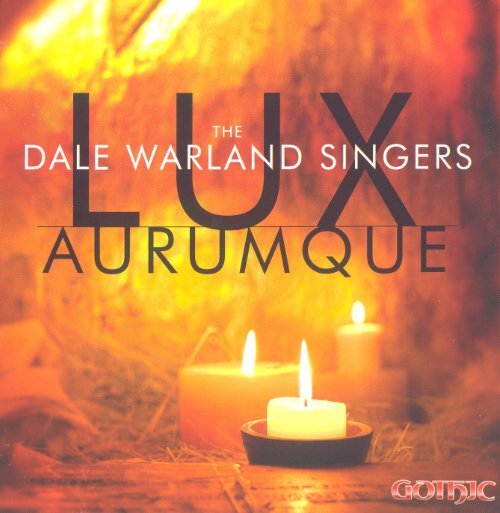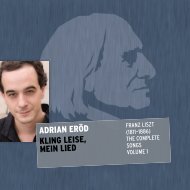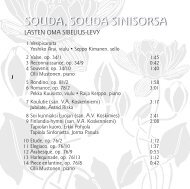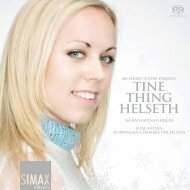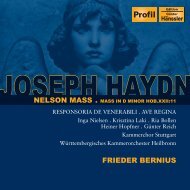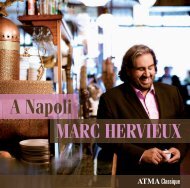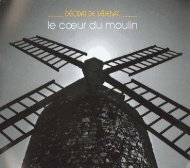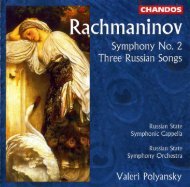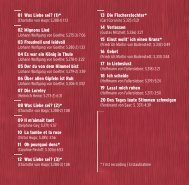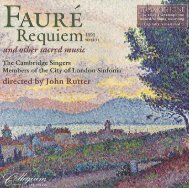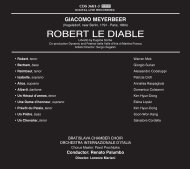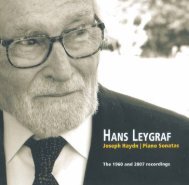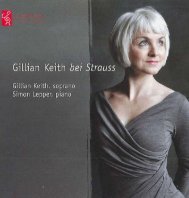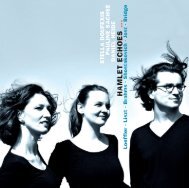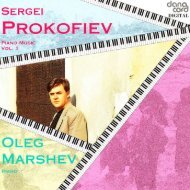Create successful ePaper yourself
Turn your PDF publications into a flip-book with our unique Google optimized e-Paper software.
tracklist I I \/<br />
from Choral Concerto<br />
11 WeBymnThee SergeiRacbmaninoff 2:53<br />
from Liturgy of St. John Chtysostorn, Op. 31, NO. 12<br />
12 To God "In Memoriam M B." Dominick. Atgento 3:28<br />
13 Otche Nash [Our Fa<strong>the</strong>r) Nilai Golovanov 3<br />
TOTAL 63:51
<strong>the</strong> artists<br />
The Dale Warland Singers' final<br />
concert on May 30, 2004, concluded 31<br />
years of concerts, tours, radio broadcasts,<br />
and critically acclaimed recordings. The<br />
Dale Warland Singers were recognized as<br />
one of <strong>the</strong> world's foremost a cappella<br />
choral ensemble. The 40-voim professional<br />
choir was based in MinneapoliilSt. Paul.<br />
Dale Warland, celebrated American<br />
musician, has made an indelible impression<br />
on <strong>the</strong> landscape of contemporary choral<br />
music both nationaily and internationally.<br />
During his time with <strong>the</strong> Dale Warland<br />
Singers, he shaped a vocal ensemble known<br />
for its exquisite sound, technical finesse,<br />
and stylistic range. From that platform,<br />
Warland not only mastered <strong>the</strong> iraditional<br />
repertoire, but also commlssloned 270 new<br />
choral works.<br />
The music world has responded by<br />
bestowing its highest honors on Warland,<br />
including, most recently, <strong>the</strong> 2006 Choral<br />
Arts Society of Philadelphia's Individual<br />
Leadership in Choral Music Award. O<strong>the</strong>rs<br />
include <strong>the</strong> Champion of New Music Award<br />
from <strong>the</strong> American Composers Forum<br />
(2005), Honorary Doctorates from<br />
Macalester College and <strong>the</strong> University of<br />
Minnesota (20041, a Distinguished Master<br />
Artist Award from <strong>the</strong> University of South<br />
Florida [2004), a Grammy nomination of<br />
Walden Pond for best choral performance<br />
(2003), <strong>the</strong> prestigious ASCAP [American<br />
Society of Composers, Authors and<br />
Publishen] Victor Herbert Award (2003) in<br />
recognition of Warland's artistic<br />
contributions, <strong>the</strong> Sally Irvine Ordway<br />
Award for Vision 120031, and a special<br />
award fmm Chorus America and ASCAP for<br />
Warland's "pioneering vision, leadership<br />
and commitment to commissioning and<br />
performing new choral works at <strong>the</strong> highest<br />
level of artisay" (20021. He also received <strong>the</strong><br />
1995 Wchael Kom Founder's Award <strong>the</strong><br />
highest honor for a choral conductor in <strong>the</strong><br />
United States. previously awarded to Bobert<br />
Shaw, Margaret Hillis, and Roger Wagner,<br />
among o<strong>the</strong>rs.<br />
Warland's appearances as guest<br />
conductor have taken hlm to <strong>the</strong> podiums<br />
of many of <strong>the</strong> wodd's leading choirs and<br />
vocal ensembles. He has also rehearsed and<br />
prepared choirs for performances of major
works in collaboration with notable<br />
conducton and composers including Robert<br />
Shaw, Edo de Waart, Leonard Slatkin,<br />
Stanislaw Skrowaczewski, Sir Neville<br />
Marriner, Kryzstof Penderecki, Roger<br />
Nonington, James Conlon, Hugh WoH, and<br />
Bobby h4cFerria<br />
Warland is committed to sharing his<br />
knowledge about <strong>the</strong> choral arts and has<br />
served on <strong>the</strong> jury for <strong>the</strong> Eric Ericson<br />
Award [an international choral conducting<br />
competition held in Sweden]; was a faculty<br />
member for <strong>the</strong> All-Japan Chorus League<br />
National Competition in Fukuoka, Japan,<br />
has lectured on American music at <strong>the</strong><br />
Sibelius Academy in Hdsinkj, served on <strong>the</strong><br />
artistic staff of <strong>the</strong> Tolosa Choral F&kd in<br />
Spain; acted as co-chair of both <strong>the</strong> choral<br />
and recording panels of <strong>the</strong> National<br />
Endowment for <strong>the</strong> Arts, and completed a<br />
19-year tenure as Director of Choral Music<br />
at Macalester College in St Paul Minnesota<br />
Warland's compositions and<br />
arrangements have been performed and<br />
recorded by choruses throughout <strong>the</strong><br />
country. As editor, he has estabiishd choral<br />
series with G. Schirmer, Hal Leonard,<br />
earthsongs, Colla Voce, and Walton Music.<br />
Since <strong>the</strong> dosing of <strong>the</strong> Dale Warland<br />
Singers organization in June 2005, Warland<br />
remains active as guest conductor,<br />
composer, teacher, and producer of choral<br />
programs for public radio. Additional<br />
recordings of Dale and <strong>the</strong> Dale Warland<br />
Singers on <strong>the</strong> Gothic and reZound labels<br />
indude Walden Pond: Marsic of Dominick<br />
Argenfo (G-49217, a Grammy Award<br />
nominee), Rachmaninors Vespers (RZCD<br />
501 I), Chrishm with <strong>the</strong> Dale Warland<br />
Singers (G-49208), Reincarnations (G-<br />
49239). and Hamt Home: Songs F m <strong>the</strong><br />
Hart (G-492431. All available titles from<br />
<strong>the</strong> Dale Warland Singers' dimgraphy can<br />
be found at www.gothic-cata1og.com.
OF THY MYSTICAL SUPPER, Opus 58, No. 7 Nkchefi Tvoyeyd mi'ya)<br />
Mat<strong>the</strong>w Culloton, baritone<br />
<strong>the</strong> music<br />
Alexandre Gretchaninoff fled post-revolution Russia for Paris and spent <strong>the</strong> last<br />
decades of his life in <strong>the</strong> United States. Thii motet dates from his church days when he was<br />
making a name for himself with dark, lavishly layered music that sounds to our ears<br />
immediately "Russian." Gretchaninoffs is almost symphonic choral music: bi sixteen-part<br />
pieces that reach for <strong>the</strong> effect of an orchestra. "Of Thy Mystical Supper" is Iditionally<br />
sung on Thursday of Holy Week as <strong>the</strong> Orthodox faithful celebrate Communion.<br />
Vkhefi nyeyd b6ynlyR d ki,<br />
Sftie Bdzhiy,<br />
piichdshiika rid piii6f:<br />
fie bo wagdm Tvolm ldynu pot%ns,<br />
hi lobedffip fi dam piko I@,<br />
no ybko mabciyiik isp-u m:<br />
potk~21ii aQ, ~hdspodi, w tdrst8ii<br />
Tv4yPm.<br />
Of Thy Mystical Supper,<br />
0 Son of God,<br />
accept me today as a partaka:<br />
for I will not speak of Thy Mystery<br />
to Thine enemies,<br />
ndthrr like Judas will I give T he<br />
but like <strong>the</strong> thief will I c onk Ree:<br />
"Remember me, 0 Lord, in Thy Dngdom.'<br />
text: from <strong>the</strong> Liturgy of Great and Holy Thusday<br />
music: Alexandre Gretchaninoff (1 864-1956)<br />
A FRAYER OF THE MIIIDLE AGES<br />
finished his career showwed with honorary<br />
degrees. Despite all <strong>the</strong> acclaim (or because<br />
Howard Hanson headed <strong>the</strong> University of it), Hanson atlmcted scholarly scorn for<br />
of Rochester's Eastman School of Music for being devoted to tonal music malting him<br />
several decades, where he composed astoundingly out-of-fashioa Hk motet "A<br />
prolifically, won a Pulitzer Prize (19441, and Prayer of <strong>the</strong> Middle &S" dates from <strong>the</strong>
United States bicentennial and starts in <strong>the</strong><br />
most American way: with a fanfare, this one<br />
for voim. Wead of driving to a big 'tahdah"<br />
ending, though, <strong>the</strong> brilliance softens<br />
as <strong>the</strong> <strong>singers</strong> repeat <strong>the</strong> phrase "<strong>the</strong> greatest<br />
marvel." A section of denser, searching<br />
music follows unM <strong>the</strong> words, Thou who<br />
madest heaven and earth" where Hanson<br />
revels in <strong>the</strong> glory of <strong>the</strong> hied-and-true G<br />
major scale. His critics ground <strong>the</strong>ir teeth at<br />
such music, but Hanson could do nothing<br />
but stay loyal to his muse.<br />
We declare unto all <strong>the</strong> ages<br />
as <strong>the</strong> gmten marvel,<br />
ere <strong>the</strong>re were MIS and trem or <strong>the</strong> mighty ocean,<br />
ere <strong>the</strong> sunlight shone forth<br />
or <strong>the</strong> moon ma in beams,<br />
when naught was, from end to end,<br />
<strong>the</strong>re wert Thou, 0 God, Thou almighty God,<br />
from time unknown to time unknown,<br />
Eternal God,<br />
lkou who madest heaven and earth,<br />
give to US wisdom, prudence and strength,<br />
give through Thy holy blming faith unending<br />
that Thy will we may do.<br />
Amen.<br />
text: ca. 700 AD<br />
music: Howard Hanson (1 896- 198 1)<br />
0 SACRUM CONVMUM<br />
Vytautus Miikinis is <strong>the</strong> artistic<br />
director of <strong>the</strong> famous Azuoliukas Male<br />
Choir, profasor of choral conducting at <strong>the</strong><br />
National Academy of Music in Vilnius, and<br />
president of <strong>the</strong> Lithuanian Choral Union.<br />
He also holds <strong>the</strong> title of artistic director<br />
and chief conductor of <strong>the</strong> All-Lithuanian<br />
Choral Festival. For many years, Mikinis<br />
conducted <strong>the</strong> Kaunas State Choir and<br />
Vocal Ensemble Museum Musicum. His<br />
choirs have won prestigious prizes at<br />
numerous national and international<br />
competitions. Miikinis is often invited to<br />
1- on music education, serve as guestconductor<br />
and present conducting seminars<br />
in Lithuania and abroad. He has<br />
participated in numerous national and<br />
international choral events as a jury<br />
member, conductor or composer. He has<br />
written some 100 religious motets, 10<br />
masses and a large nnumkr of secular songs.<br />
0 s m m ronviviurn begins with <strong>the</strong><br />
beautiful clustered sounds of <strong>the</strong> tenors and<br />
basses. With this foundation, he layers on<br />
lovely chants in <strong>the</strong> women's voices,<br />
eventually sending <strong>the</strong>m into <strong>the</strong> treble<br />
clefs higher altitudes where men could<br />
never hope to go. The men remain
anchored, and in <strong>the</strong> penultimate bar of this lovely Communion motet <strong>the</strong> basses finally<br />
amve on a low D-flat, a critical note <strong>the</strong>y've avoided <strong>the</strong> whole piece, and here <strong>the</strong><br />
unmistakable effect is one of coming home.<br />
0 s m m ronuiw'um,<br />
in quo Chrism sumitur,<br />
rerolitur memoria p~ssionis eius,<br />
mm implehar gmria<br />
etfuflarne gloriue.<br />
0 samd banquet at which Christ<br />
is consume4<br />
<strong>the</strong> memoIy of his Passion is<br />
recalled, our souls are fdled with grace,<br />
and <strong>the</strong> pledge of future glory.<br />
music: Vytautus m nis (b. 1954)<br />
TAKE HIM, EARTH, FOR CHERISHING<br />
England's Herbert Howells composed<br />
this motet in <strong>the</strong> spring of 1964, and<br />
dedicated it "to <strong>the</strong> honoured memory of<br />
John Fitzgerald Kennedy, President of <strong>the</strong><br />
United States of America." The work was<br />
premiered later that year in Washington,<br />
D.C. Having lost his own young son to a<br />
debiljtating neurological disease a few years<br />
earlier, Howells was aware of <strong>the</strong> pained<br />
state of <strong>the</strong> audience who would fist hear<br />
this music, so his setting begins with a<br />
sense of quiet reverence. Quickly <strong>the</strong><br />
here <strong>the</strong> music broadens and dia back until<br />
<strong>the</strong> final repetition af <strong>the</strong> opening text:<br />
"Take him, earth, for cherishing"<br />
Take him, earth, for cherishing<br />
To thy tender breast receive hi.<br />
Body of a man I bring ape,<br />
Noble even in iB ruin.<br />
Once was this a spirit's dwellin$<br />
By <strong>the</strong> breath of God created<br />
High <strong>the</strong> heart that here was M ng,<br />
Christ <strong>the</strong> prince of all i& lhg.<br />
hammonies become thicker, <strong>the</strong> mood more ~ ~ him ~ c<strong>the</strong> d dead 1 give <strong>the</strong>e,<br />
agitated, leading to an expansive climax at NO^ unmindhl of is mature<br />
<strong>the</strong> words, "Take, 0 take him, mighty shaU he askit: He who made it<br />
Imder, Take again thy servant's soul." From Symbol of Hi my-.
Comes <strong>the</strong> hour God bath appointed<br />
To fulfill <strong>the</strong> hope of men,<br />
Then must thou, in very fashion,<br />
What I giw,return again.<br />
Take him earth for cherishing<br />
Body of a man 1 brlng <strong>the</strong>e.<br />
Not though ancient time decaying<br />
Wear away <strong>the</strong>se bones to sand,<br />
ash^ that a man might treasure<br />
In <strong>the</strong> hollow of his hand:<br />
Not though wandering winds<br />
and idle winds .<br />
Drifhg through <strong>the</strong> empty sky,<br />
Scattpr dust was nem and sinew.<br />
It is given to man to die.<br />
Onm again <strong>the</strong> shining mad<br />
Leads to ample Paradise;<br />
Open are <strong>the</strong> woods again,<br />
That <strong>the</strong> Selpent lmt for men,<br />
Take 0 take Mm, mighty leader,<br />
Take again thy servant's soul.<br />
Grave his name, and pour <strong>the</strong><br />
Fragrant Balm upon <strong>the</strong> icy stone.<br />
Take him, earth, for cherishing,<br />
To thy tender breast receive him.<br />
Body of a man I bring <strong>the</strong>e+<br />
Noble in irs ruin.<br />
By <strong>the</strong> breath<br />
of God created,<br />
Christ <strong>the</strong> prince<br />
of all i& living<br />
Take, 0 take him.<br />
Take him, earth<br />
for cherishing.<br />
text: Prudentius (348-4 131,<br />
from Humnus circa Exsequius DefuncCi<br />
kanslation: Helen Waddell by permission<br />
music: Herbert Howells (1892-1983)<br />
SALVATION IS CREATED (SpuZMye sod~lal)<br />
Pavel Chmnokov was a prolific composer of nearly 500 choral works, 400 of <strong>the</strong>m for<br />
<strong>the</strong> Church. He stands out for his reliance on iraditional chant melodies. In this way he was<br />
part of <strong>the</strong> Synodal School's movement to restore <strong>the</strong> glories of ancient tunes to<br />
contemporary Orthodox music. 'Salvation Is Created" is a Communion hymn traditionally<br />
sung in Friday services.<br />
Salvation is created in <strong>the</strong> midst<br />
of <strong>the</strong> earth, 0 Gd.<br />
Alleluia, Alleluia, Alleluia.<br />
text: Communion Hymn For Fridays (Psalm 74: 12)<br />
music: Pavel Chesnokov (1 877- 1944)
HYMN TO THE CREATOR OF LJGHT<br />
John Rutter's beautiFul doubl~choir motet, "Hymn to <strong>the</strong> Creator of Wt," is dedicated<br />
to <strong>the</strong> memow of Herbert Howells and was written for <strong>the</strong> dedication of <strong>the</strong> Howells memorial<br />
window in Gloucester Ca<strong>the</strong>dral in 1992. Few music teachers in twentieth-mtury Britain<br />
were more influential than Howells, who greeted his first dass at London's Royal College of<br />
Music in 1920 and his last over 50 years later. Rutter carries Howells' torch in his dual roles as<br />
a prolific choral composer and conductor of <strong>the</strong> superb Cambridge Singers. As always. Rutter<br />
is sensitive to <strong>the</strong> twt, but he does especially lovefy work here with <strong>the</strong> word "light"<br />
Glory be to <strong>the</strong>e, 0 lord, glory be to <strong>the</strong>e,<br />
Creator of <strong>the</strong> visible light,<br />
The sun's ray, <strong>the</strong> flame of firr;<br />
Creator also of <strong>the</strong> light imrisIblt and intellectual:<br />
That which is known of God, <strong>the</strong> light invisible.<br />
Glory be to <strong>the</strong>e, 0 Lord, glory be to <strong>the</strong>e,<br />
Creator of <strong>the</strong> light<br />
for writings of <strong>the</strong> law, glory be to <strong>the</strong>e:<br />
for oracles of prophets, glov be to <strong>the</strong>e:<br />
for melody of psalm glory be to <strong>the</strong>e:<br />
for wisdom of proverbs glory be to <strong>the</strong>e:<br />
experience of histories, glory be to tbee:<br />
a light which never sets.<br />
God is <strong>the</strong> Lord, who hath shewed rn light.<br />
Light, who dost my soul enlighten;<br />
Sun, who all my life dwt brighten;<br />
Joy, tho sweet& man e'er knoweth:<br />
Founk when@? all my being floweth.<br />
Fmm thy banquet let me measure,<br />
Lord, how vast and deep its treasurer:<br />
Thmugh <strong>the</strong> gifb thou here dwt give us,<br />
As thy gumt in heaven rrceive us.<br />
text (fmt stanza): Landot Andrewes<br />
(1555-1626)<br />
banslation: Alexander Whyk<br />
(second stand: J. Franck (1618-1677)<br />
@anslation: Ca<strong>the</strong>rine Wiorth (adapted)<br />
music: John Rutter (b. 1945)<br />
0 MAGNmf MY- California, wrote 0 mnpum mysderium in<br />
1994 for <strong>the</strong> Los Angeles Master Chorale.<br />
Morten Lauridsen, a longtime faculty His inspiration, as for countless composers<br />
member at <strong>the</strong> University of Sou<strong>the</strong>rn before him, was <strong>the</strong> irony contained in this
chrismas picture: <strong>the</strong> newborn Lord of all, lying in <strong>the</strong> midst of lowly barn animals. This<br />
music has become a kind of greatest hit for Lauridsen, performed by choirs all over <strong>the</strong><br />
world in <strong>the</strong> decade since its birth-a surprisingly big splash for a piece that Lauridsen calls<br />
"a quiet song of profound inner joy."<br />
0 naegnum mysterium,<br />
et admimbik summenturn,<br />
ut unimalia viderent Dominuiw<br />
namm, jamturn in pmesepio!<br />
Beata Virgo, mjur viscem<br />
mewrunt portme<br />
Dominum Chrismm. Alkluial<br />
0 mat mystKY<br />
and wondmus saaament,<br />
that animals should rpe <strong>the</strong> newborn lord,<br />
lying in <strong>the</strong>ir manger1<br />
Blessed is <strong>the</strong> Vigin whme womb<br />
was worthy to bear <strong>the</strong><br />
Lord Jesus Christ Alleluia1<br />
music: Morten Lauridsen @. 1943)<br />
LUX AURUMQUE<br />
Tmsa Timey, soprano<br />
The DaIe WarIand Singers began performing <strong>the</strong> music of Eric Whitacre when <strong>the</strong><br />
composer was only in his twenties. His Wntw Night and Cloudburst showed an amazing gift<br />
for choral writing-and Whitacre has only continued to expand on that gift. The beauty of<br />
LIIX Aurumque, as in his o<strong>the</strong>r works, is how Whitacre tightens <strong>the</strong> screws to <strong>the</strong> inner<br />
harmonies, and <strong>the</strong>n leases <strong>the</strong>m. He took a novel approach to this text, choosing an<br />
English poem and having it translated into Latin for this setting<br />
Lut;<br />
calida graukque pum vrIut aumm<br />
et canunt angcIi mollim<br />
mod0 natum.<br />
LIghk<br />
warm and heavy as pure gold<br />
and <strong>the</strong> angels sing softly<br />
to <strong>the</strong> newborn baby.<br />
text: Edward Esch<br />
translation: Charles Anthony Silvestri<br />
music: Eric Whitacre [b. 19701
AVE MARIA<br />
Joel C. Fischer, tenor Eric N. Hopkim, tmor Mat<strong>the</strong>w Cullotm, bavibone<br />
Biebi was born in Austria in 1906, fought briefly in World War 11, and was captured<br />
and held prisoner of war for several years in an American war camp in Michigan. At war's<br />
end he returned to Austria and devoted himself to writing music. His most well-known<br />
work, Ave Maria, written in 1964, is stunning. It is for seven-voice men's choir, Iuxuriant to<br />
<strong>the</strong> point of sensuous, yet also deeply reverent<br />
Avr Mariu gmtia p ha<br />
Doainus recum<br />
bmedirtu tu in mulieribus<br />
et betredictus firm yen^<br />
mi, Jesus.<br />
Sancta Maria manr Dei<br />
om pm nabis peccuturibus<br />
nunc et in OM mmh's nostme.<br />
Amen.<br />
Hail Mary full of grace,<br />
The Lord is with <strong>the</strong>e<br />
Blessed an thou among women<br />
And blessed is <strong>the</strong> fruit of thy womb*<br />
J-1~5.<br />
Holy Mary, Mo<strong>the</strong>r of God<br />
Pray for us sinners<br />
Now and at <strong>the</strong> hour of OM dea~.<br />
Amen.<br />
music: Franz Biebl (1906-2001)
COMPLETE THIS WORK (from Choral Concerto)<br />
Alfred Schnittke was born in Soviet Russia, though his parents were German, and so<br />
was his first language. He became one of Russia's prize musical sons, graduating from <strong>the</strong><br />
Moscow Conservatory where he also taught for many years. EarIy on he made a name for<br />
himself as <strong>the</strong> creator of dense and imubling avant garde works. Later in his career, his<br />
musical style became more straightforward. His Choral Concerto (1984-85). a big 45-minute<br />
score divided into four movements and based on <strong>the</strong> devotional Book oflamentotiom by<br />
<strong>the</strong> tenth-century Armenian poet Gregoty of Nar* is one of <strong>the</strong>se later straightforwardstyle<br />
works. Schnittke composed it around <strong>the</strong> time of a major heart attack, and perhaps for<br />
that reason <strong>the</strong> last movement, "Complete this work," has a reflective, almost nostalgic feel<br />
to it, calling up <strong>the</strong> spirit of ancient Russian chant. Gregory's words ("that my singing may<br />
become healing")and <strong>the</strong> beautiful setting Schnittke gives <strong>the</strong>m make a fitting benediction.<br />
Sej tmd, shto nachinal fa supavan>em<br />
i symmm him,<br />
ty zamchi,<br />
shtob pcsnapen ye stala vrachcvan ?em,<br />
tsei'ashchim rnny teln I dushi.<br />
Ijeslf mid, moj skomnyj aovershitsa stvaim<br />
put' dukh gaspoden, vn'om sajedinitsa<br />
sa sktadnym vdakhmvenjem maim,<br />
tnboj daruvannqje azum]e<br />
ne pugosi<br />
moj razum ne pakin,'<br />
rso unof ptijmlf vaskhua~rn]~<br />
at tuajevo<br />
sluzhitel'a,<br />
amin.<br />
Complete this work<br />
Which I began in hope<br />
And with Your name,<br />
So that my singing may become healing,<br />
Curlng <strong>the</strong> wounds of body and soul.<br />
If my humble work is finished<br />
With your holy blessing -<br />
May <strong>the</strong> divine spirit In It<br />
Join with my meager inspiration,<br />
Do not extinguish<br />
The revelation You have granted,<br />
Do not abandon my reason,<br />
But, again and again, receive praise<br />
From your sewant.<br />
Amen.<br />
text: Grtgory of Narek (tenth century) music: Alfred Schnittke (1934-1998)
WE HhlN THEE (Teh poyPmJ (from Liturgy of St. John Ch ysostom, Opus 3 1, No. 12)<br />
Lynette Johnson, mezzo soprano<br />
Rachmaninoffs motet, "We Hymn Thee," is taken from his Liturgy of St. John<br />
Grysostom which stirred a hornet's nest of controversy when it was unveiled in 1910<br />
Moscow. The Orthodox Church scorned any composer who harmonized <strong>the</strong> ancient Russian<br />
chants, particularly Rachmaninoff, whose setting is so lush.<br />
!+ poyfm,<br />
TebC bIagosIoi.im,<br />
bblgodaiim, ~kdspdi,<br />
i mdTim%6, Bdzhr nosh.<br />
We hymn Thee,<br />
we bless Thee,<br />
music:<br />
we give thanks to Thee, 0 Lord, Sergei Rachmaninoff<br />
and we pray unto The 0 our God. (1873-1943)<br />
TO GOD 'IN MEMOW M.B."<br />
Marfin Hodel, hwmpet<br />
Argento dedicated this motet in memory of Marlene Baver, deputy organistchoirmaster<br />
at Plymouth Congregational Church, Minneapolis, a member of <strong>the</strong> music staff<br />
at Macalester College and a close friend of Dale and Ruth Warland. Premiered in 1994, it<br />
pays tribute to Baver's almost quarter-century of service at Plymouth, and to her diverx<br />
talents. Besides filling in when organist Philip Bmnelle was out of town, she was a fine<br />
trumpeter and flutist So in tribute to her, Argento's setting of Robert Herrick's poem h m<br />
1647 ends with a touching solo trumpet line, marked in <strong>the</strong> score "distant and simple."<br />
Do with me, God! As Thou dida deal with John,<br />
Who writ that heavenly Revelation]<br />
Let me [like him) first cracks of thunder heare;<br />
Then let <strong>the</strong> Harps inrhantment mikc mine paw;<br />
Here give mt thomes; <strong>the</strong>re, in thy Kingdome, set<br />
Upon my head <strong>the</strong> golden coronet;<br />
There give me day; but here my dreadful1 night:<br />
My sackcloth here: but <strong>the</strong> my S*k of white.<br />
text: Robert Herrick (1 59 1-1674) music: Dominick Argento (b. 1927)
OTCHE NASH (OUT Fa<strong>the</strong>r)<br />
By his twenty-fifth birthday, Nikolai Golovanov had created nearly two dozen choral<br />
works for <strong>the</strong> Church. His most glorious is this &g of <strong>the</strong> Lord's Prayer. It builds slowly<br />
with thick chords toward <strong>the</strong> pasionate climax ("But deliver us from <strong>the</strong> Evil One"], which<br />
Golovanov asks <strong>the</strong> choir to sing %th desperation."<br />
~ieb'nash nasdshchnfy d a z nam ~ di&,<br />
i ostdii num doIgi nhha,<br />
m z h e i mi' ostav&em dolahiikdm ndshlfpl:<br />
I iie 6di NU w Vdkushbiiye,<br />
no izedll nus ot lukdvago.<br />
Our Fa<strong>the</strong>r, who art in heaven,<br />
hallowed be Thy name.<br />
Thy m o r n corn.<br />
Thy will k done on earth as it is<br />
in heaven.<br />
Give us this day ow daily bread;<br />
and forgive us our debts.<br />
as we forgIw OUT debtors;<br />
and lead us not into temptation,<br />
but deliver us from <strong>the</strong> EvIl One.<br />
text: from <strong>the</strong> Divine Liturgy music: Nikolai Golovanov I189 1 - 1953)<br />
-Notes by Brian Newhouse
<strong>the</strong> <strong>dale</strong> <strong>warland</strong> <strong>singers</strong><br />
SOPRANO<br />
W h Althof<br />
Wendi Buck $<br />
SamDick +<br />
Marie Spar Dymit '<br />
gorissa F.rbelp %<br />
Camk Hofstad *<br />
Amanda Page Johnson 8<br />
Pamela Mmtem J +<br />
Sarah Sthlom Melander t<br />
MelissaMmey +<br />
Melissa O'NdU S<br />
Deborah Loon<br />
Jennifer Rissman *<br />
Jodi Rowe $<br />
Dawn Schuffenh~uer<br />
Naomi Staruch<br />
Monica Stranon 9 +<br />
Tms nmey *<br />
Lori V-a 5<br />
ALTO<br />
Abbie Betink $<br />
Sara Boos B t<br />
Erin Colwitz +<br />
Leslie Qulglcy CcrnUs D<br />
Galina Erickson $<br />
Joanne Halvorsen '<br />
Melissa Culloton *<br />
Lynette Johnson<br />
Shcllcy Klint 9 t<br />
Natalia Kojanwa $<br />
Anna George Meek $<br />
Mary Maiden-Mu&<br />
W J. Pdmquist + $<br />
Kathlm Robinson 3<br />
Ktlly Beckcr Sorkln +<br />
Rosita Tendall I<br />
TENOR<br />
Jared L. Anderson' 3 +<br />
Joel Beyer 5 +<br />
Joel C Fischer<br />
Jon Hermanson *<br />
Erlc N. HopkIns<br />
Chris Jachn J<br />
Justin KaRh<br />
NiroIas Eugene Lemme $<br />
David Lower $<br />
Davld Modi I +<br />
Aobm Pontlou $<br />
Hal Snyder<br />
Anthony Sofie *<br />
Gregory Tamhomino 5 +<br />
BASS<br />
Duane E. Andersen *<br />
Jrffrry Bipcs +<br />
Bruce Broqurst I +<br />
Mat<strong>the</strong>w Culloton '<br />
Eric Wtad $<br />
Dave JacobsOn<br />
BrIan Kremer I 4<br />
PartIck McDonough *<br />
Michael Mcyer<br />
Jack Nelson +<br />
Tim O'Brien l +<br />
Robert Pesbin r3<br />
BrIan L Petty l +<br />
James Ramlet 3<br />
Brad hyan +<br />
Thomas Sh[fer t<br />
TeriySh&z#+<br />
st- Shtppd 5<br />
Brian L. Steele
credits<br />
Lux AURUMQU<br />
THE DALE WARLAND SINGERS<br />
DALE WARLAND CONDUCTOR<br />
Recorded May 2001, April 2002, and March 2004<br />
Chapel of Saint Thomas Aquinas, The University of Saint Thomas<br />
St. Paul, Minnesota<br />
~xe'cutive producer:<br />
Producer and digital editing:<br />
Recording and mastering engineer:<br />
Editing preparation:<br />
Production manager:<br />
Booklet editor:<br />
Booklet coordinator:<br />
Graphic designer:<br />
Photographer (candles):<br />
Special thanks to:<br />
Roger W. Sherman<br />
Stwe Barnett, Barnett Music Productions<br />
Preston Smith, Perfect Record<br />
Dale Warland, Ma<strong>the</strong>w Culloton,<br />
Debra Harrer, Ruth Warland<br />
Debra H a m<br />
Jennifer Fanning<br />
Debra Hamr<br />
Dominic Arizona Bonuccelli (www.design44.u~)<br />
Dominic Arizona Bonuccelli (www.azfoto.com~<br />
Gayle Ober, Carol Barnen, Dwight Bigler,<br />
Philip Blackburn, Galina Erickson,<br />
Rob Strusinski<br />
Catalog Number: G 49252 8 & 8 2007 by Loft Recordings, LLC All Rights Reserved
Of Thy Mystical Supper, Opus 58, No. 7: copyright 1995 Musica Russica, Inc. Uscd by ~ l o n<br />
A Prayer of <strong>the</strong> Middle Ages: copyright * 1976 by Carl Flschm, Inc. by earthsow Used by permission.<br />
0 samm convlvium: copyright 0 2030 by Edition Ferrimontana, Frankfurt am Main.<br />
Used by permission.<br />
Take Hlm, Earth, For Chrrlshing: copytight * 1964 by H.W. Gray Co., Inc. Used by permhion.<br />
Salndon Is (hated: copyright 0 1995 by Musica Russica. Used by permission<br />
Hymn to <strong>the</strong> Creator of Light: copyright * 1993 by Oxford Universiw Press. Used by p e~ion<br />
0 magnum mysteriurn: copyright 1395 by Sou<strong>the</strong>rn Music Publishing Co., Inc.<br />
by Pw-Sou<strong>the</strong>rn Concm Music Used by permission.<br />
Lux Aurumque: copyright 2001 by Walton Music Corporation. Used by permission.<br />
Ave Marla: copyright 0 unknown by Hinshaw Music, Inc. Uxd by pedssion.<br />
Complete This Work [ hm Choral Concerto): G. Schlrmu, Inc. Used by permission.<br />
We Hymn Thee (fmm Lihw of St. John Chlysostoq Opus 3 1, No. 12):<br />
copyright * 199 1 by Musica Russica, Inc. Uscd by pmnlssion.<br />
To God "ln Memoriam W.": copyright a 1995 by Boosey & Hawk, Inc. Used by permission.<br />
Otche Nash [Our Fa<strong>the</strong>r): copyright<br />
1391 by Musica Rwica, Inc. Used by pamission.


